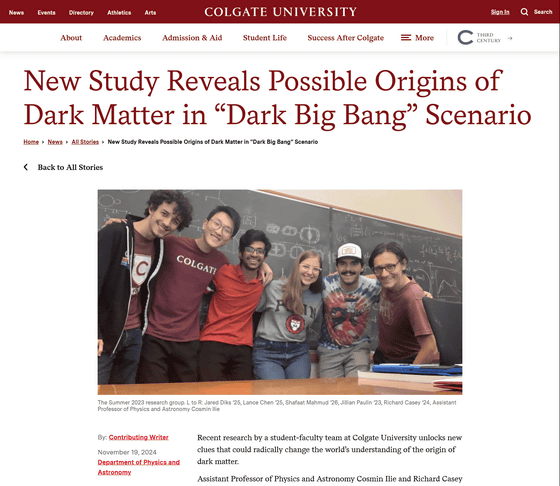Did dark matter come from a 'dark big bang'?

Dark matter is a substance that makes up most of the mass in the universe, but its true nature is still unknown. Various studies are being conducted on dark matter, and recently, scientists at Colgate University in the United States have examined the theory that dark matter was created in a 'dark big bang.'
Phys. Rev. Lett. 133, 211001 (2024) - Dark Matter Production during Warm Inflation via Freeze-In
New Study Reveals Possible Origins of Dark Matter in “Dark Big Bang” Scenario | Colgate University
https://www.colgate.edu/news/stories/new-study-reveals-possible-origins-dark-matter-dark-big-bang-scenario

Cosmological model proposes dark matter production during pre-Big Bang inflation
Mysterious 'Dark Big Bang' Could Explain The Origins of Dark Matter : ScienceAlert
https://www.sciencealert.com/mysterious-dark-big-bang-could-explain-the-origins-of-dark-matter
It is widely accepted that all the matter that fills our universe originated from the Big Bang, but the origin and nature of dark matter remains a mystery.
Although dark matter has never been detected directly, nor has it been detected in accelerators, its gravitational effects have been convincingly demonstrated both within and outside of galaxies, and it has left an observable signature in the cosmic microwave background radiation from the Big Bang, the so-called ' Big Bang afterglow '.
In 2023, Catherine Freese and Martin Winkler of the University of Texas at Austin published a paper stating that dark matter is different from ordinary matter and may have arisen from an 'alternate Big Bang' that is thought to have occurred a few months after the Big Bang.
Phys. Rev. D 107, 083522 (2023) - Dark matter and gravitational waves from a dark big bang
https://journals.aps.org/prd/abstract/10.1103/PhysRevD.107.083522
Associate Professor Cosmin Ily and Richard Casey of Colgate University have explored and improved all possible scenarios that are consistent with the latest experimental data to realize the 'alternative Big Bang,' or 'dark Big Bang,' model proposed by Fries and others. They have discovered a previously unexplored range of variables that could explain the origin of dark matter. This discovery paves the way for further verification of clues left in the present universe by various scenarios leading to the dark Big Bang, such as traces of gravitational waves.
'Detecting gravitational waves from the dark Big Bang could provide conclusive evidence for new theories of dark matter,' said Associate Professor Illy. 'With the success of missions like the International Pulsar Timing Array (IPTA) and the Square Kilometre Array (SKA), we may have the tools to test the dark Big Bang model in unprecedented ways.'
Signatures of background gravitational waves observed in June 2023 by the North American Nanohertz Gravitational-Wave Observatory , part of IPTA, may be related to the establishment of the dark Big Bang.
Research organization announces that it will make an 'important announcement' on June 30, 2023, and that it may have detected evidence of 'background gravitational waves' that may be a trace of the origin of the universe - GIGAZINE

'With more precise observations in the future, gravitational background waves may help prove that the dark Big Bang is the true origin of dark matter. The discovery by Associate Professor Illy and his colleagues also provides new insights into the early history of the universe and the forces that shaped its evolution, and may have implications beyond dark matter,' said Professor Illy.
Related Posts:
in Science, Posted by logc_nt







